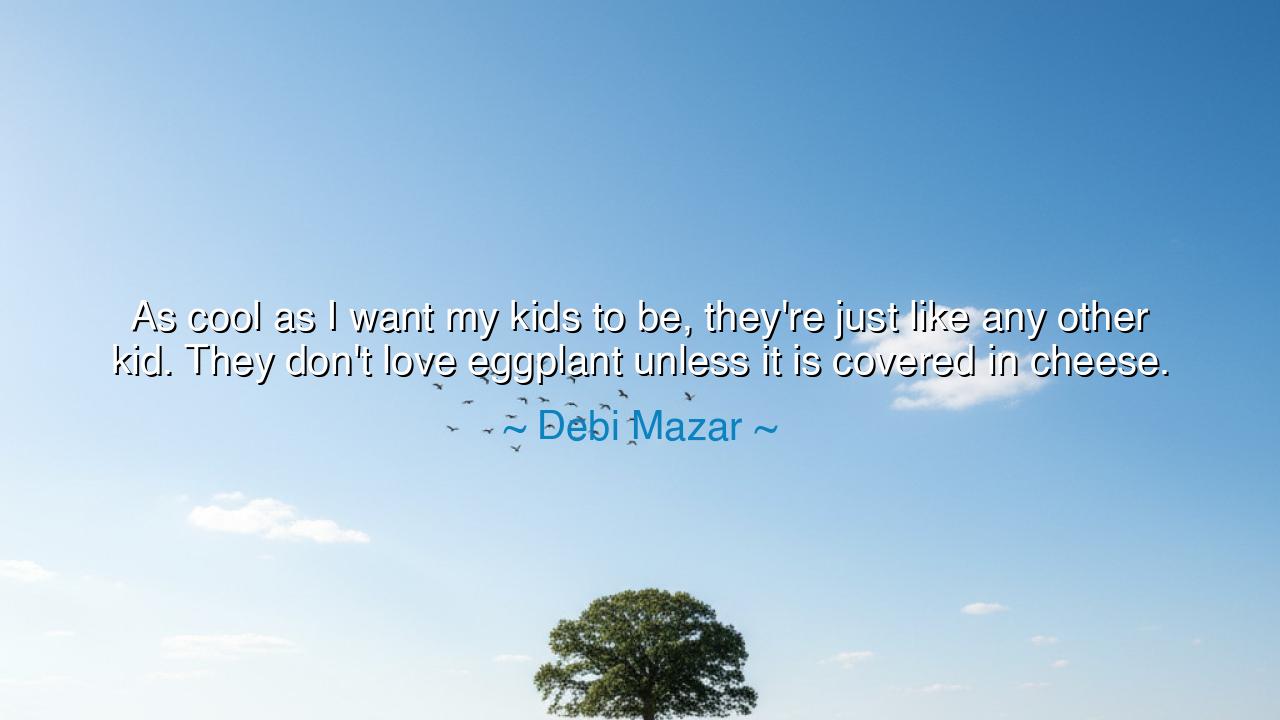
As cool as I want my kids to be, they're just like any other kid.
As cool as I want my kids to be, they're just like any other kid. They don't love eggplant unless it is covered in cheese.






The actress Debi Mazar, known for her style, strength, and spirit, once said with laughter and tenderness: “As cool as I want my kids to be, they’re just like any other kid. They don’t love eggplant unless it is covered in cheese.” Beneath this simple, playful remark lies a truth both ancient and eternal — the truth that no matter how extraordinary we wish our children to be, they remain human, pure and unshaped by pretense. They remind us, with innocent stubbornness, that life’s beauty lies not in perfection or coolness, but in authenticity.
In the rhythm of her words, Mazar speaks as both a mother and a sage. She confesses that even in a world obsessed with image — where one might hope to raise children who are bold, refined, and effortlessly unique — the essence of childhood endures. A child’s nature is not to conform to ideals, but to be: to explore, to resist, to find joy in the simplest of things. The refusal to love the eggplant, that humble vegetable of earthy flavor, becomes a metaphor for all the ways our children remain true to themselves, untouched by our ambitions or our illusions. It is a humorous reminder that individuality cannot be manufactured; it blossoms naturally, in its own time.
The origin of this wisdom is rooted in the timeless bond between parent and child. For as long as humankind has raised families, parents have dreamed of shaping their offspring into reflections of their highest hopes — strong, intelligent, cultured, noble. Yet the ancients understood what Mazar reveals with wit: that the child’s spirit cannot be molded by force. In Greek philosophy, it was said that “nature loves to hide,” meaning that the truest essence of a thing reveals itself only in its own rhythm. A parent’s task, then, is not to impose identity, but to nurture the soil in which the child’s nature may unfold freely.
The great Roman emperor Marcus Aurelius, who was also a father, once wrote that even the mightiest must learn patience with the ways of others, especially the young. He urged himself to “accept things as they are,” recognizing that control over another’s will is an illusion. In his wisdom, as in Mazar’s humor, there lies the same gentle surrender — the recognition that love, not ambition, is the truest guide in raising children. Whether in the halls of power or the kitchens of family life, this truth endures: the greatest act of strength is to allow others — even one’s own children — to be as they are.
Mazar’s eggplant becomes a symbol of all that is good and ordinary. She, a woman of art and culture, may see beauty in the complex, in the taste refined by experience. But her children, with their simple palettes and unpretentious joy, remind her that life does not always need sophistication to be full. They are mirrors of nature itself — unfiltered, innocent, and honest. Their dislike for the eggplant is not defiance, but truth. And by recognizing this, the mother becomes a student again, learning from her children the art of simplicity and acceptance.
There is a powerful humility in these words, a lesson every generation must learn anew. Parents often seek to make their children “cool,” “successful,” or “exceptional,” forgetting that the truest mark of greatness is the freedom to be ordinary — to laugh, to dislike, to prefer what brings joy over what others deem worthy. The ancients praised this as the virtue of contentment — the ability to dwell in the real, rather than chase the illusion of perfection. Mazar’s humor hides a quiet reverence for this truth: her children, in their simplicity, are already perfect, not because they are cool, but because they are themselves.
The lesson, then, is both light and profound: let your loved ones be who they are, and let that be enough. Whether you are a parent, a mentor, or a friend, release the need to control or embellish. Celebrate the authentic, even when it is messy, plain, or imperfect. Life’s sweetness lies not in grandeur, but in moments of truth — in laughter over an untouched plate of eggplant, in the warmth of shared understanding.
So, remember the wisdom of Debi Mazar — that even in a world of glamour, authenticity is the rarest beauty. Children, in their honesty, teach us what it means to be real. They show us that love does not demand transformation, but acceptance. Cherish the ordinary, and in it, you will find the divine. For just as cheese softens the bitterness of eggplant, so too does love soften the edges of expectation — turning what is simple into something infinitely sweet.






AAdministratorAdministrator
Welcome, honored guests. Please leave a comment, we will respond soon